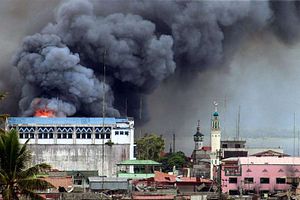Last week, we saw the convening of a counterterrorism symposium in Singapore. Though the symposium itself was just one development within a broader regional conversation around the terrorism challenge and Singapore’s efforts tied to its ASEAN chairmanship this year, it nonetheless put the focus on what remains one of the top security priorities for policymakers through 2018.
As I have noted repeatedly in these pages and elsewhere, a series of terrorist incidents over the past few years have made clear that terrorism in Southeast Asia has emerged as a threat to a level not seen since after the September 11 attacks, from the siege by Islamic State-linked militants in the southern Philippine city of Marawi last year to the attacks in Surabaya, Indonesia, which took place in June (See: “ASEAN’s Post-Marawi Islamic State Challenge”).
Given all this, it is little surprise that the terrorism threat has continued to factor into key security discussions in the region this year. Indeed, Singapore, this year’s holder of the annually rotating ASEAN chairmanship, has made terrorism among the top priorities on the defense side, reinforcing the need for a more comprehensive-whole-of-government approach to counter the terrorist threat under a “Resilience, Response, and Recovery” framework for counterterrorism.
As the regional conversation on the terrorism threat has continued through the year, there have been a string of measures proposed, discussed, and implemented to varying degrees by regional states. Cases in point include trilateral patrols in the Sulu-Sulawesi Seas between Indonesia, Malaysia, and the Philippines as well as the Indonesia-led ‘Our Eyes’ initiative focused on boosting intelligence collaboration (See: “What’s Next for the New ASEAN ‘Our Eyes’ Intelligence Initiative?”).
Last week, the challenge was in the spotlight again with the holding of the two-day 2018 Southeast Asia Counterterrorism Symposium in Singapore organized by the S. Rajaratnam School of International Studies (RSIS) from October 4-5. The event, which Singapore had billed part of its ASEAN chairmanship this year, put a spotlight on some of the main lines of effort to counter terrorism, including countering terror networks, employing advanced technologies, building societal resilience, and fostering regional cooperation.
The actual deliberations featured remarks and interactions between scholars and officials. For instance, Indonesian Defense Minister Ryamizard Ryacudu unsurprisingly put the focus on intelligence collaboration as a key aspect of creating a “new security architecture” for ASEAN to address the terrorism threat, noting that the Marawi crisis had demonstrated the culpability of regional governments in not exchanging sufficient intelligence.
There were also various events and meetings held on the sidelines of the Symposium. For instance, Singapore’s Defense Minister Ng Eng Hen and other Singapore officials met with their counterparts from fellow regional states including from Malaysia and Indonesia, which provided an opportunity to discuss a range of security issues such as counterterrorism. In his remarks, Ng also noted some of the agenda items being discussed by Southeast Asian states on the counterterrorism front as well.
To be sure, the symposium is just one of several events that spotlight the terrorism challenge and the region’s efforts to tackle it under Singapore’s chairmanship this year. The focus on this is expected to continue with remaining meetings through 2018, including the upcoming ASEAN meetings such as the ASEAN Defense Ministers’ Meeting (ADMM) and the ASEAN Defense Ministers’ Meeting Plus (ADMM-Plus). Those meetings will tell us more about the region’s evolving response to the terrorism threat, and the work that remains to be done in the coming years as well.
































